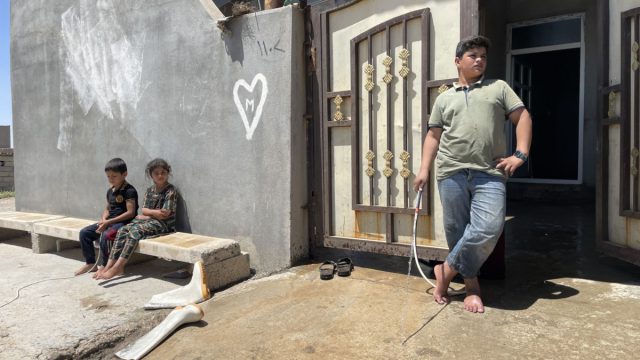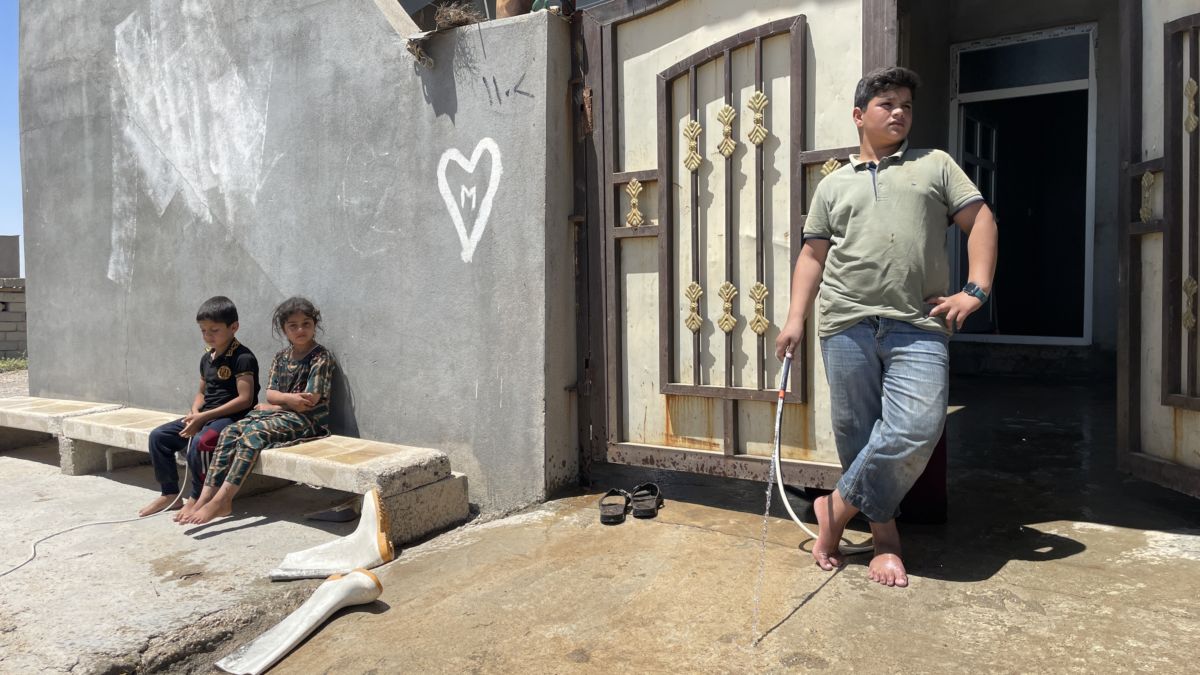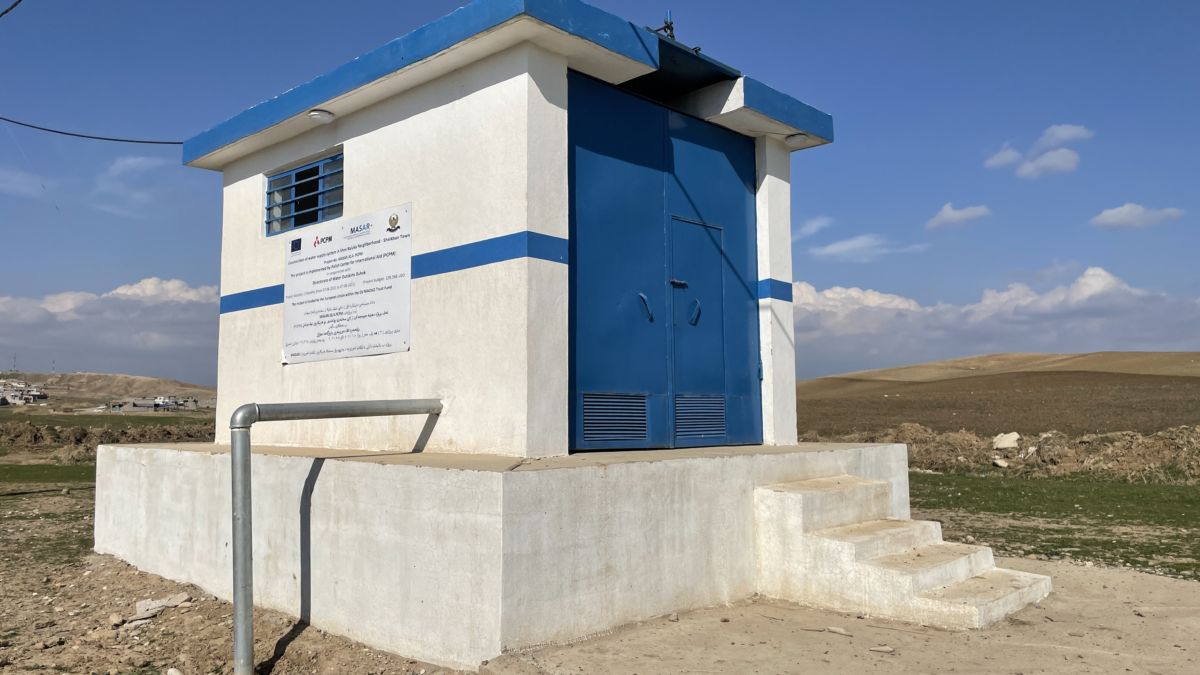PCPM secures running water for thousands in Iraq’s Shekhan Region



Khairy Khader Yazdeen, chief of the Shekhan regional water directorate, said the investment has made a real difference: ‘Climate change makes it hard for people to have running water. Drought and lack of rain cause the groundwater to dry up, so now we rely on rainwater. But we’re not getting much rain. Just 20 years ago the hills around the town were green in springtime; now, they’re covered by sand and dust. Furthermore, water demand has increased significantly due to refugees sheltering with us from ISIS. Because of these changes in water resources, we were forced to dig deeper and deeper, but the shortage kept getting worse. Our residents use water taken from tanker trucks and special cisterns’ – Yazmeen says.
The investment of more than $200,000 built water mains and repaired the sewage network in Batnaya village as part of the PCPM Foundation’s MASAR project (Maintaining Strength and Resilience for Local Governments in Iraq and Lebanon). It will provide sewage services to 200 families who have already returned to the town while encouraging more returns in the long term. The project also helped build water supply networks in the western part of Shekhan city (Shev Baluka district) and Bibawa and Kame villages (Iraqi Kurdistan), installing water pipelines and electricity to bring water and power directly to households.
‘Thanks to the PCPM wells, water pumps have been made to bring water to the western part of our city. Currently, 1,400 people are using them but the target will be 4,000-5,000 people. Thanks to the water pumps, we can build a sewerage and water supply system using wider pipes that pump more water, and we can deliver it to the most remote areas of the city’ – explains the chair of the Sheehan Municipality Water Directorate. Residents of Batnaya village, where PCPM implemented one of its projects, admit that the lack of running water was a fundamental problem and was one of the reasons why the town is depopulating.
‘There used to be 1,500 families living here today there are only 180. A good amount of people fled ISIS, we were on the front line, and residents moved to the Kurdish-inhabited area. We are a village on the border between federal Iraq and Kurdistan, but neither side wants us because we are mostly Chaldeans, so as a minority we are a nuisance. We do see interest from various foreign organizations, but aside from the fact that they come here and ask about our needs but does not bring any results. We do not see any change – one organization gives up, others help, but the money is scattered at higher levels of administration’- says Batnaya villager Abu Yusef.

‘Only now are we seeing real help from people from Poland. We were coping with the water supply because we were using large tanks, but the problem was with dirty water – all the sewage was either poured into the field or taken away by a septic tanker, which cost extra. As the dirty water flew onto the field, it damaged the roads, destroyed the crops, and stank. Now we have a system that takes all the dirty water away from us and discharges it into the sewer’ – Abu Yusef adds.
The shortage of running water was, and still is, one of the local community’s main problems. Adding to the PCPM’s challenge in implementing the project was the construction. It was in an area previously targeted by fighting with the so-called Islamic State.
‘When we started the construction of the sewer drainage, we had to plan the course of action very carefully and thoroughly because this village lay on the front line of the fighting with ISIS. There are still unexploded bombs in the rubble, those covering the project area and the ground. This required a tone of office visits and paperwork to ensure various sections were cleared. We did not have certainty anyway. We approached construction work with extreme caution. Suffice it to say that armored excavators were used for earthworks’- says the PCPM representative in Iraq, Jaroslaw Zarychta
‘In Batnaya, we built a sewer interceptor and about two hundred meters of sewage disposal canal. This is enough infrastructure for the entire village of Batnaya. In the course of the work, we dug up an illegally connected fiber optic cable and had to get permission to move one military check-point due to a change in the access road to the village’ – he adds. The PCPM attached immense importance to the systematic examination of the quality of the work and the materials used – the Foundation’s staff monitored whether the technical specifications of the pipes and equipment used were following the requirements from the tender, so the constructing crew was not using substitutes of lower quality.
NOT ONLY ACCESS TO WATER BUT ALSO EDUCATION ABOUT THE NEED TO CONSERVE IT
In addition to infrastructure investments in northern Iraq, the Polish Center for International Aid provides training for engineers and officials in planning and building water and sewage networks using CAD software. PCPM is also conducting an educational campaign for the local community to encourage water conservation.
‘We realize this knowledge and awareness is not present in our community. We treat water as an unlimited resource. Illegal connections to and water theft are also a problem in our municipality. Our municipality lies in a disputed area on the border of two administrative units – Kurdistan and federal Iraq. This increases the chaos of management and control, and responsibility blurs. There is no unit responsible for illegal connections to the water system and water theft’- admits the chair of the Sheehan municipality’s water directorate, Khairy Khader Yazmeen.
In Sheehan, the educational campaign conducted by the PCPM Foundation consisted of distributing leaflets distributed door-to-door to all households that had gained access to potable water, as well as talking to household members by volunteers.
‘We bring the aspect of public education about saving water and reducing water consumption to the spotlight. We printed and later distributed flyers from house to house in the western part of Sheehan. This is where the most significant water shortages occurred, among other things, by poor water and sewage infrastructure. That inevitably results in an extremely high loss of water during transmission. We have also produced an educational video with our local partners, which we want to publish on local social media channels – explaining PCPM’s representative in Iraq, Jaroslaw Zarychta.
Significantly, the staff of the water directorate independently designed the flyers. They went through training beforehand in PR design, promotional materials, and social media by using graphic programs. The directorate staff received the appropriate computer equipment. The video-making took place in Mosul, Iraq. The production broadcast will be available on social media and public television. The employees went through training, and they received the gear. The video clip was their initiative and based on their script.
With EU funds and the MASAR (Maintaining Strength and Resilience for Local Governments in Iraq and Lebanon) program, the PCPM is supporting Iraqi local governments with, among other things, investments in water infrastructure, capacity building for effective territorial governance and urban planning, and boosting local economic development. Inadequate infrastructural development and problems in these areas of life are causing the Iraqis to choose illegal, dangerous migration to Europe, including through Belarus.
Unfortunately, the Polish Center for International Aid’s mission in Iraq is in danger of closing unless the PCPM Foundation succeeds in securing other resources for operations in the country beyond the EU project, which ends in December 2022.
Follow us on social media:
We publish current information on the aid provided by the PCPM Foundation on Twitter.
Foundation’s official profile on Instagram – @fundacjapcpm
Foundation’s official Facebook profile – Polish Center For International Aid